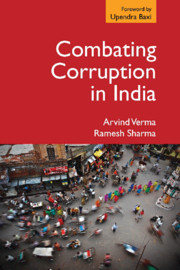Book contents
- Frontmatter
- Contents
- List of Tables and Figures
- Acknowledgements
- Foreword
- 1 Introduction
- Part I Corruption in India
- Part II Combating Corruption in India
- 4 Anti-Corruption Machinery: CVC and CBI
- 5 Evaluating Efficacy of Anti-Corruption Agency: Case Study from Madhya Pradesh
- 6 Lokpal and Lokayukta: A Critical Examination
- Part III Way Forward: Alternate Solutions
- Bibliography
- Index
6 - Lokpal and Lokayukta: A Critical Examination
from Part II - Combating Corruption in India
Published online by Cambridge University Press: 13 November 2018
- Frontmatter
- Contents
- List of Tables and Figures
- Acknowledgements
- Foreword
- 1 Introduction
- Part I Corruption in India
- Part II Combating Corruption in India
- 4 Anti-Corruption Machinery: CVC and CBI
- 5 Evaluating Efficacy of Anti-Corruption Agency: Case Study from Madhya Pradesh
- 6 Lokpal and Lokayukta: A Critical Examination
- Part III Way Forward: Alternate Solutions
- Bibliography
- Index
Summary
An ombudsperson by the nomenclatures of ‘Lokpal’ at the central government level and ‘Lokayukta’ at the state level, to address the inadequacies of the current anti-corruption systems, have been major issues of agitation by Anna Hazare and many citizen groups in the past few years. These Indian ‘ombudsperson’ armed with the power and independence to investigate and prosecute cases of corruption are purported by these agitators to be the best mechanism for handling growing corruption in the country. The Lokpal and Lokayuktas Act, 2013 (No. 1 of 2014) has come into existence. While it will take time to assess the operations, impact and the efficacy of Lokpal, its possible role in combating corruption can still be examined on the basis of its provisions, structure and from comparative perspectives. The current discourse questions the perspective that an independent Lokpal alone is capable of combating corruption in the country. We pay special attention to the composition, selection and powers of the Lokpal to judge its powers and functioning. Specific examples from different Lokayuktas, already operational in different states, further provide the context to make this assessment. A comparative evaluation of the powers and performance of several international systems of ombudsperson are also analyzed to determine how far this design of Lokpal will be successful in its mission of combating corruption effectively in the country. We argue that such ombudsperson needs to go beyond the limited objective of prosecuting the corrupt officials. Prevention of corruption must be an integral part of its functions and it must also serve to educate and engage the citizens to deal with corruption. We provide evidence that Lokayuktas that have been in operation for many years have failed to evolve as institutions that can reform the ‘rotten barrel’ which spoils the apples.
Introduction
The need to have an institution independent of the government that can examine the complaints against public servants, including ministers serving the government, was felt as early as the eighteenth century when parliaments in Europe asserted their independence from the monarch ruling the country. Sweden was the first country that established the office of ombudsperson, an officer appointed by the legislative body to receive and investigate complaints against unjust administrative action. Since the king appointed the ministers and public servants, the objective clearly was to give the Parliament a means of balancing the wide powers exercised by the King.
- Type
- Chapter
- Information
- Combating Corruption in India , pp. 173 - 212Publisher: Cambridge University PressPrint publication year: 2018



